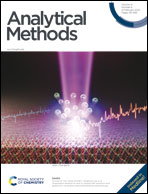Ionic-liquid-based effervescence-enhanced magnetic solid-phase extraction for organophosphorus pesticide detection in water samples
Abstract
Herein, an ionic-liquid-based effervescence-enhanced magnetic solid-phase extraction (ILE-MSPE) approach for the extraction/concentration of organophosphorus pesticides in waters is reported with high stability and portability for rapid sample pretreatment in the field. The ionic-liquid-based magnetic effervescent tablet, composed of magnetic nanoparticles (Fe3O4), sodium carbonate (Na2CO3) as an alkaline source, and an ionic liquid ([C6MIM][PF6]), played triple functions: extractant, dispersant, and retrieving agent. Based on the one-factor-at-a-time method, the important variables for the ILE-MSPE approach were optimized as follows: as an extractant, 70 μL of [C6MIM][PF6]; molar ratio of alkaline to acidic sources (Na2CO3 : H2C4H4O6) as 1 : 1; and mass of magnetic nanoparticles (MNPs) of 30 mg. By integrating HPLC-DAD detection, the ILE-MSPE approach offered the limits of detection of 0.14–0.22 μg L−1 and fortified recoveries of 81.4–97.6% for three representative species (methamidophos, phoxim, and parathion) in water samples. The relative standard deviations were lower than 4.9% for both the intra-day and inter-day precision. Overall, the newly developed method is environmentally benign, time-saving, and feasible for outdoor application.



 Please wait while we load your content...
Please wait while we load your content...